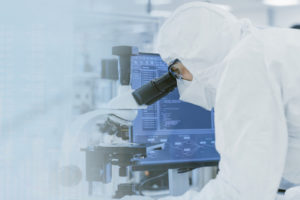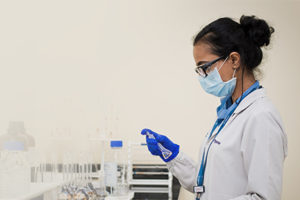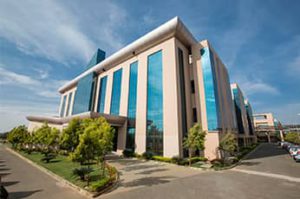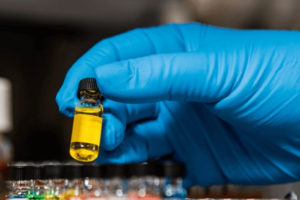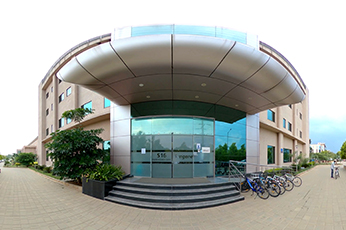Supporting product development with expertise and state-of-the-art facilities
Syngene’s team for chemical process design, development, and optimization offers a wide range of services that support the product development cycle. Our services include route scouting, chemical process optimization, chemical process familiarization, feasibility studies, and scale-up activities.
Our highly experienced team of over 250 scientists and research engineers efficiently carry out studies to quickly deliver on a project using a phase-appropriate and fit-for-purpose development approach. The team also provides expert scientific advice on synthetic methodology tools and development approaches. Our state-of-the-art laboratories include high-end process research and development (PRD) tools such as quality by design (QbD) and utilize process analytical technology (PAT) techniques.
Capabilities
Route scouting
Our large, globally experienced team of discovery chemistry and chemical process development scientists provide in-depth route design, development, and optimization services. The team identifies novel synthesis routes using literature tools such as SciFinder, Reaxys, Beilstein as well as several international chemistry journals. Our team is well-versed with retrosynthetic approaches as well as various fields of chemical process development.
Chemical process development
Our experts quickly select a few promising routes for further screening, apply a proof of concept approach to select the best route, and develop it into a large-scale process. We also conduct engineering studies and analytical development as part of the process development, with green chemistry principles such as environmental factor (e-factor) and process mass intensity (PMI) built into the overall approach.
We conduct development studies in a world-class laboratory equipped with miniature reactors and relevant engineering tools. Our team translates chemical reactions into a safe, reliable, efficient, and cost-effective manufacturing process for active pharmaceutical ingredients (APIs), intermediates, regulatory starting materials, and performance chemicals.
Our facility includes a dedicated development and manufacturing site that enables us to develop highly potent API (HPAPI) compounds for use in oncology, one of the fastest-growing segments of the pharmaceutical and biotechnology industry, and other therapeutic areas. We have a team of highly experienced scientists and engineers supporting the HPAPI development needs of multiple clients.
Chemical process optimization
Our team focuses on maximizing the potential economics of chemical processes by leveraging decision variables within known constraints to provide an economic, safer, and convergent chemical manufacturing process. We absorb chemical processes at any level of maturity to understand critical process parameters and perform complete optimization using classical or statistical tools such as design of experiments (DOE).
We prepare demonstration batches in the development/kilo lab to verify preferred process conditions, once identified. The team uses process simulation and modeling exercises to ensure that the batches are executed using a data-based decision process. Our experts also use parameters such as normal operating range (NOR), proven acceptable range (PAR), and edge of failure studies to ensure that the process is highly reproducible in most manufacturing environments.
Identification and characterization of impurities
We identify and characterize process impurities using our knowledge of raw materials, synthesis methods, and storage stability. This helps us understand reaction pathways, conduct impurity purge studies, fine-tune process parameters, and comply with regulatory requirements. We postulate the structure of unknown impurities using analytical techniques such as nuclear magnetic resonance (NMR) spectroscopy and mass spectrometry (MS) analysis.
We completely characterize the screened impurities, including organic and inorganic molecules, metals, and residual solvents, using purification techniques to isolate them, or through using retrosynthetic analysis to synthesizing them. We also conduct extensive spiking studies in actual reactions to measure the tolerability of impurities in the optimized process.
Chemical process engineering
Our chemical process engineers work closely with scientists from the start of the process development activity to identify gaps, and develop robust, scalable processes to meet challenging timelines.
We conduct various unit operations and studies including software-based DOE studies, QbD and process control justification (PCJ) studies, process intensification studies, kinetic studies and modeling, and mass and energy balance studies. We also perform corrosion, filtration, drying, and distillation studies using regular and packed columns, as well as crystallization studies. Additionally, we also perform scale-up and scale-down studies, batch to continuous flow chemistry, and particle engineering studies. Our process analytical technology (PAT) tools include focused beam reflectance measurement (FBRM), particle vision and measurement (PVM), and ReactIR.
DOE and QBD studies
Design of experiments (DOE) and quality by design (QbD) studies are recognized by customers globally and are a key differentiator in the development space. Over the years, we have continued to evolve the approach, methodology, and tools that we developed in this area. We adopt a risk-based systemic approach such as DOE to design experiments for QbD, which provides substantial information, helps optimize, and develop a design space for the process. The developed design space is then validated with experiments and considered for scale-up.
Our expertise includes performing PCJ studies, regression analysis, and process modeling, as well as using statistical process control (SPC) methods to develop robust, quality-focused, reproducible, economic, and safe scalable processes.
Chemical process safety
Chemical process safety is at the core of Syngene’s chemical process development, as demonstrated by our impeccable safety record. Our process safety management philosophy, derived from the centre for chemical process safety (CCPS), is incorporated right from the first process discussion stage and can be traced throughout project execution. We thoroughly and systematically evaluate factors such as consideration of risk-based process safety (RBPS), reagent selection, route selection, experimental planning, batch size selection, equipment selection, and manufacturing plans.
Syngene’s process safety team is equipped with basic and advanced tools to evaluate risk, both qualitatively and quantitatively, against challenging timelines. Our qualitative analysis techniques include what-if analysis, process hazard analysis (PHA), process hazard identification and risk analysis (PHIRA), hazard and operability study (HAZOP), hazard analysis (HAZAN), failure mode and effects analysis (FMEA), layer of protection analysis (LOPA), process review, and feasibility analysis.
For these analyses, we use advanced tools such as differential scanning calorimetry (DSC), RC1e reaction calorimeter, thermogravimetric analysis (TGA), CHETAH (Software-based evaluation program), off-gassing studies for vent sizing, and accelerated rate calorimetry (ARC). On occasion, we collaborate with external partners to perform studies such as minimum ignition energy (MIE), minimum ignition temperature (MIT), percussion tests, and dust explosivity tests.
Salt and polymorph screening
Syngene’s salt and polymorph screening studies are conducted by a cross-functional team, including experienced process chemists, solid-state experts, research engineers, pre-formulation experts, and formulators. Our screening studies follow a tiered approach and enable us to select the best physical properties of the drug substance to ensure efficacy and provide consistency during formulation and manufacture.
The salt screening process involves searching for solid salts of ionizable drug products considering factors such as pharmaceutically acceptable counter-ions, frequency of use in drug products, and manufacturability. We identify the most stable thermodynamic polymorph using neat and mixed solvents.
Process research and development/Process chemistry services
Our dedicated process research and development(PRD) team comprises highly skilled scientists and chemical engineers, with about 15% holding Ph.D. degrees and the rest holding master’s degrees. The PRD team collaborates on various projects such as supporting route design and optimization, including DOE and QbD approaches for early phase and late phase projects.
Our services also include polymorph screening, salt screening, crystallization development, analytical development, process engineering data generation, process safety, flow chemistry development, stability studies, integrated chemistry, manufacturing and controls (CMC) projects, cost-saving programs, and regulatory support.
Infrastructure
Syngene’s fully equipped PRD laboratory allows the rapid development of scalable and robust chemical processes using advanced methodologies. Our facility includes a kilo lab that enables us to cater to clients in the early phase of development.
Other top-quality equipment in our facility includes reactor systems such as the Asahi/ Syrris Atlas automated reactor system, jacketed glass reactors that can handle volumes from 100 milliliters to 20 liters, and flow process equipment such as tubular and packed bed reactors used in synthetic processes. We use a range of easy-to-use single and parallel synthesis platforms such as Easy max 402 for parallel synthesis, HEL Polyblock with eight reactor platforms, and Radley’s Mya4 synthesis platform. Our laboratory also includes distillation systems set up for regular and packed column analysis.
We conduct quantitative analysis in our hazard evaluation laboratory using tools such as RC1e, DSC, ARC, gas quantification setup, and TGA. The PAT tools for our chemical process engineering service include FBRM, PVM, online pH, and ReactIR. Our facility is equipped with crystallization systems and particle analyzers such as Crystal16, Malvern particle analyzer, and a particle microscope to conduct polymorph screening studies. Our teams also use analytical instruments such as high-performance liquid chromatography for in-process monitoring and Karl Fisher titrators, and potentiometric titrators.
Additionally, our labs include Radley’s carousel system, filtration study equipment, freeze driers, dosing pumps for acids, bases, slurry, and powder, and a library of agitators including anchor, retreat, pitched blade turbines, flat blades, and Rushton discs.



